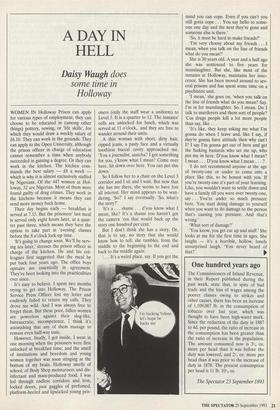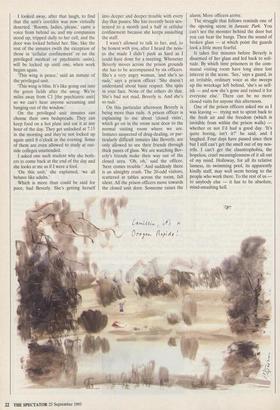A DAY IN HELL
Daisy Waugh does some time in Holloway WOMEN IN Holloway Prison can apply for various types of employment; they can choose to be educated in (among other things) pottery, sewing, or 'life skills', for which they would draw a weekly salary of £6.10. They can work in the grounds. They can apply to the Open University, although the prison officer in charge of education cannot remember a time when anybody succeeded in gaining a degree. Or they can work in the kitchen. The kitchen com- mands the best salary — £8 a week — which is why it is almost exclusively staffed by Nigerians. Of the 447 women at Hol- loway, 32 are Nigerian. Most of them were found guilty of drug crimes. They work in the kitchens because it means they can send more money back home.
Their day begins early — breakfast is served at 7.15. But the prisoners' last meal is served only eight hours later, at a quar- ter past three, which means they have the option to take part in 'evening' classes before the 8 o'clock lock-up time.
'It's going to change soon. We'll be serv- ing tea later,' stresses the prison officer in charge of the kitchen. He and his col- leagues first suggested that the meal be put back four years ago. The office boys upstairs are essentially in agreement. They've been looking into the practicalities ever since.
It's easy to believe. I spent two months trying to get into Holloway. The Prison Service Press Officer lost my letter and endlessly failed to return my calls. They drove me wild. And I was always free to forget them. But these poor, fallen women are powerless against their slug-like, bureaucratic, incompetence. think it's astonishing that any of them manage to remain even half-way sane.
However, finally, I got inside. I went in one morning when the prisoners were first unlocked at breakfast time; and the smell of institutions and boredom and young women together was soon stinging at the bottom of my brain. Holloway smells of school; of Body Shop moisturisers and dis- infectant and mass-produced food. I was led through endless corridors and iron, locked doors, past gaggles of perfumed, platform-heeled and lipsticked young pris- oners (only the staff wear a uniform) to Level 3. It is a quarter to 12. The inmates' cells are unlocked for lunch, which was served at 11 o'clock, and they are free to wander around their units.
A thin woman with short, dirty hair, ripped jeans, a pasty face and a virtually toothless buccal cavity approached me. 'You a journalist, aintcha? I got something for you, y'know what I mean? Come over here. Sit down over here. You can put this down.'
So I follow her to a chair on the Level 3 corridor and I sit and I wait. But now that she has me there, she seems to have lost all interest. Her mind appears to be wan- dering. 'So?' I say eventually. 'So, what's the story?'
'It's a. . . shame . . . d'you know what I mean, like? It's a shame you haven't got the camera 'cos that would back up the story one hundred per cent.'
But I don't think she has a story. Or, that is to say, no story that she would know how to tell; she rambles, from the middle to the beginning to the end and back to the middle again: `. . . It's a weird place, say. If you got the mind you can cope. Even if you can't you still gotta cope . . . You say hello to some- one one day and the next they're gone and someone else is there.'
'So, it must be hard to make friends?'
'I'm very choosy about my friends. . . I mean, when you talk on the line of friends what do you mean?'
She is 30 years old. A year and a half ago she was sentenced to five years for manslaughter. But she, like most of the inmates at Holloway, maintains her inno- cence. She has been moved around to sev- eral prisons and has spent some time on a psychiatric unit.
'I mean,' she goes on, 'when you talk on the line of friends what do you mean? Say. I'm in for manslaughter. So. I mean. Do I talk to murderers and them sort of people? 'Cos drugs people kill a lot more people than say, like . . .
'It's like, they keep asking me what I'm gonna do when I leave and, like I say, if they're gonna have attitude then why can't I? I say I'm gonna get out of here and get the fucking bastards who set me up, who put me in here. D'you know what I mean? I mean . . . D'you know what I mean . . . ?
'I do not recommend anyone at the age of twenty-one or under to come into a place like this, to be honest with you. If you're twenty-one it's part of your learning. Like, you wouldn't want to settle down and have a family till you were over twenty-one, say. . . You're under so much pressure here. You start doing damage to yourself when you want to do damage to the person that's causing you pressure. And that's wrong.'
'What sort of damage?'
'You know, you get cut up and stuff.' She looks at me for the first time in ages. She laughs — it's a horrible, hollow, lonely unsurprised laugh. 'You never heard of that?' I looked away, after that laugh, to find that the unit's corridor was now virtually deserted. 'Rooms, ladies, please,' came a voice from behind us, and my companion stood up, tripped dully to her cell, and the door was locked behind her. She, like the rest of the inmates (with the exception of those in 'cellular confinement' or on the privileged medical or psychiatric units), will be locked up until one, when work begins again.
'This wing is peace,' said an inmate of the privileged unit.
'This wing is bliss. It's like going out into the green fields after the smog. We're miles away from Cl [the psychiatric unit] so we can't hear anyone screaming and banging out of the window.'
On the privileged unit inmates can choose their own bedspreads. They can keep food on a hot plate and eat it at any hour of the day. They get unlocked at 7.15 in the morning and they're not locked up again until 8 o'clock in the evening. Some of them are even allowed to study at out- side colleges unattended.
I asked one such student why she both- ers to come back at the end of the day and she looks at me as if I were a fool.
'On this unit,' she explained, 'we all behave like adults.'
Which is more than could be said for poor, bad Beverly. She's getting herself into deeper and deeper trouble with every day that passes. She has recently been sen- tenced to a month and a half in cellular confinement because she keeps assaulting the staff.
I wasn't allowed to talk to her, and, to be honest with you, after I heard the nois- es she made I didn't push as hard as I could have done for a meeting. Whenever Beverly moves across the prison grounds she has to be accompanied by six officers. She's a very angry woman, 'and she's so rude,' says a prison officer. 'She doesn't understand about basic respect. She spits in your face. None of the others do that. She's bad not mad, Beverly is. And she's so rude.'
On this particular afternoon Beverly is being more than rude. A prison officer is explaining to me about 'closed visits', which go on in the room next door to the normal visiting room where we are. Inmates suspected of drug-dealing, or par- ticularly difficult inmates like Beverly, are only allowed to see their friends through thick panes of glass. We are watching Bev- erly's friends make their way out of the closed area. 'Oh, oh,' said the officer, 'here comes trouble.' And suddenly there is an almighty crash. The 20-odd visitors, scattered at tables across the room, fall silent. All the prison officers move towards the closed unit door. Someone raises the alarm. More officers arrive.
The struggle that follows reminds one of the opening scene in Jurassic Park. You can't see the monster behind the door but you can hear the bangs. Then the sound of broken glass — at which point the guards look a little more fearful.
It takes five minutes before Beverly is disarmed of her glass and led back to soli- tude. By which time prisoners in the com- munal visiting room have long since lost interest in the scene. 'See,' says a guard, in an irritable, ordinary voice as she sweeps up the wreckage left behind, 'she's so self- ish — and now she's gone and ruined it for everyone else.' There can be no more closed visits for anyone this afternoon.
One of the prison officers asked me as I was leaving — trying not to sprint back to the fresh air and the freedom (which is invisible from within the prison walls) — whether or not I'd had a good day. 'It's quite boring, isn't it?' he said, and I laughed. Four days have passed since then but I still can't get the smell out of my nos- trils. I can't get the claustrophobia, the hopeless, cruel meaninglessness of it all out of my mind. Holloway, for all its relative laxness, its swimming pool, its apparently kindly staff, may well seem boring to the people who work there. To the rest of us — to anybody else — it has to be absolute, mind-smashing hell.



























































 Previous page
Previous page